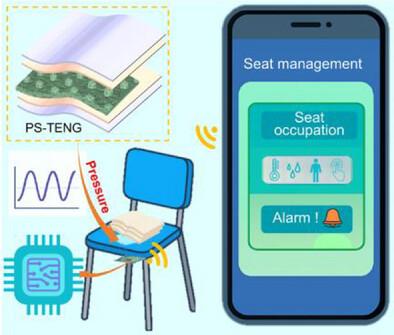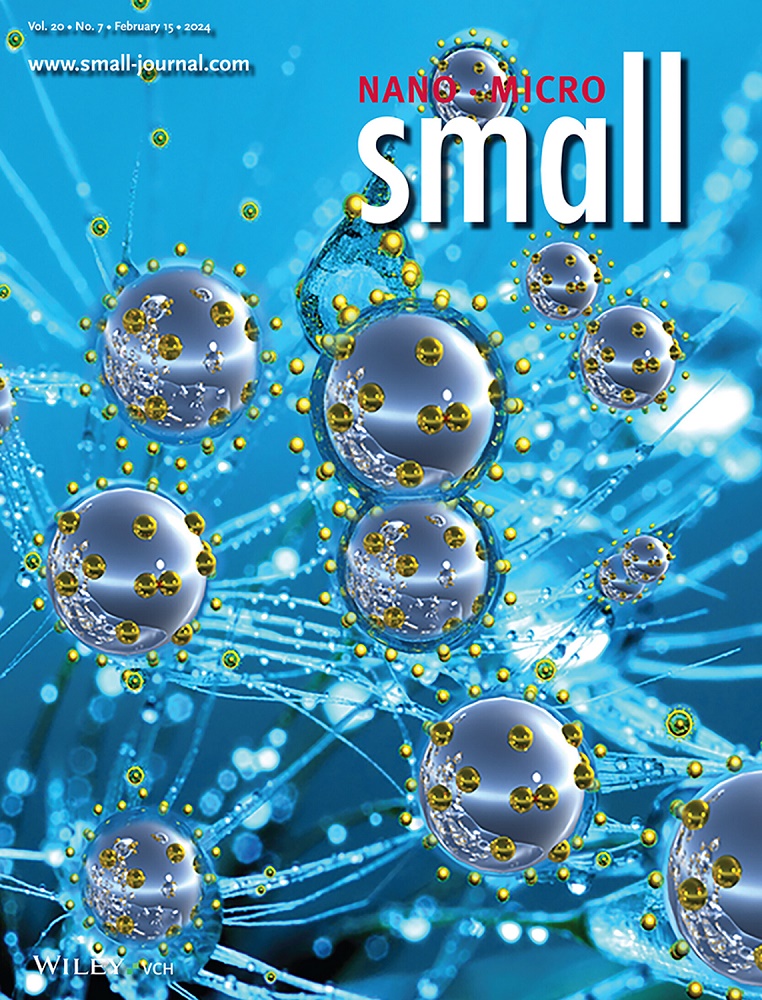基于三尺度结构的快速响应柔性摩擦电压力传感器无线智能座椅检测
IF 12.1
2区 材料科学
Q1 CHEMISTRY, MULTIDISCIPLINARY
引用次数: 0
摘要
摩擦电纳米发电机(TENG)对于可持续能源和物联网(IoT)应用至关重要,因为它们能够收集能量并充当自供电压力传感器。然而,通过简单、低成本的制造同时实现高灵敏度、宽压力检测范围和快速响应仍然是一个重大挑战。本文研制了一种基于多孔半球形突出微结构聚二甲基硅氧烷(PHP-PDMS)薄膜的压力传感TENG (PS-TENG)。PHP-PDMS表面——包括均匀分布的孔隙、周期性的半球形阵列和不规则的纳米级突起——提高了比表面积,降低了弹性模量。因此,PS-TENG实现了高灵敏度(0.87 V kPa−1),宽压力检测范围(0.02-53.3 kPa),快速响应(16.6 ms)和出色的长期稳定性,使其适合可持续的自供电传感应用。有限元模拟表明,较大的微观结构尺寸和稀疏的空间分布会导致较大的变形,从而增加接触面积和增强电荷转移。这些发现与实验结果很好地吻合,为结构优化提供了有价值的见解。PS-TENG的能量收集能力通过为发光二极管和数字湿度计供电来验证。与物联网技术相结合,可实现无线智能座椅检测系统,实现实时座椅占用情况监控和公共资源管理。本文章由计算机程序翻译,如有差异,请以英文原文为准。

Fast-Response and Flexible Triboelectric Pressure Sensors with Hierarchical Triple-Scale Structure for Wireless Smart Seat Detection
Triboelectric nanogenerators (TENG) are crucial for sustainable energy and Internet of Things (IoT) applications due to their ability to harvest energy and function as self-powered pressure sensors. However, simultaneously achieving high sensitivity, broad pressure detection range, and fast response through simple, low-cost fabrication remains a significant challenge. Herein, a pressure-sensing TENG (PS-TENG) based on porous hemispherical protrusion microstructured polydimethylsiloxane (PHP-PDMS) film is developed. The PHP-PDMS surface—comprising uniformly distributed pores, periodic hemispherical arrays, and irregular nanoscale protrusion—enhances specific surface area and reduces elastic modulus. As a result, the PS-TENG achieves high sensitivity (0.87 V kPa−1), a broad pressure detection range (0.02–53.3 kPa), fast response (16.6 ms), and excellent long-term stability, making it suitable for sustainable self-powered sensing applications. Finite element simulations reveal that larger microstructure sizes and sparser spatial distributions lead to greater deformation, thereby increasing contact area and enhancing charge transfer. These findings align well with experimental results and provide valuable insights for the structural optimization. The PS-TENG's energy harvesting capability is validated by powering light-emitting diodes and a digital hygrothermometer. When integrated with IoT technology, it enables a wireless smart seat detection system for real-time seat occupancy monitoring and public resource management.
求助全文
通过发布文献求助,成功后即可免费获取论文全文。
去求助
来源期刊

Small
工程技术-材料科学:综合
CiteScore
17.70
自引率
3.80%
发文量
1830
审稿时长
2.1 months
期刊介绍:
Small serves as an exceptional platform for both experimental and theoretical studies in fundamental and applied interdisciplinary research at the nano- and microscale. The journal offers a compelling mix of peer-reviewed Research Articles, Reviews, Perspectives, and Comments.
With a remarkable 2022 Journal Impact Factor of 13.3 (Journal Citation Reports from Clarivate Analytics, 2023), Small remains among the top multidisciplinary journals, covering a wide range of topics at the interface of materials science, chemistry, physics, engineering, medicine, and biology.
Small's readership includes biochemists, biologists, biomedical scientists, chemists, engineers, information technologists, materials scientists, physicists, and theoreticians alike.
 求助内容:
求助内容: 应助结果提醒方式:
应助结果提醒方式:


